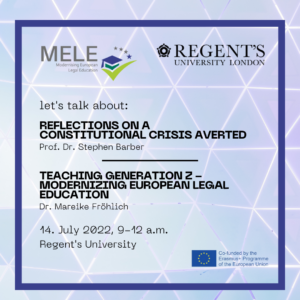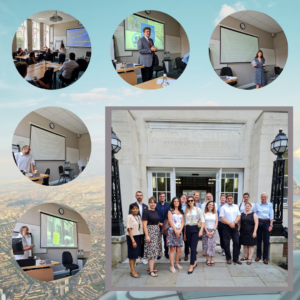Method Toolbox
Method Toolbox
OUT NOW!
The method tool box for teaching skills in legal education is based on the results of the O1, the survey regarding transversal competences in legal studies, and will be divided in three main parts:
- Transversal competences for law students,
- Handouts for different teaching methods and
- Samples of interesting teaching methods which can be used in own classes.
In detail, the box will consist of the following components:
- An introduction which summarises the results of the O1, survey regarding transversal competences.
- a manual explaining the different transversal competences and their relevance for the personal future, as well as the didactic approaches to teaching the competences; moreover the
manual includes also an overview of the different innovative teaching methods linked to the various transversal competences: - a Start-Mooting-Guide which explains the set-up and management of a moot court team as a coach
- a handbook on Clinical Legal Education and the work and structure of Legal Clinics
- examples for simulations, like dealing with an international crisis in the Model United Nations or decision-making in the European Council,
- examples for case-studies based on judgements of the European Court of Justice or European Court of Human Rights.
- examples for situation rooms, dealing with different solution scenarios,
- and more….
The aim is for the method tool box to become an important tool for all teaching staff, especially young academics, in the faculties to make their teaching contemporary and
innovative. Moreover, we think that this will have synergy effects in all partner faculties and maybe also among legal academics in the participating countries. The tool box will be made available online as a compendium and will be promoted not only among the partner faculties but also in different networks, like the European Network of Clinical Legal Education, the European Law Faculties Association, the Verfassungsblog etc.
Case Studies
You want to include case studies as a method in your classes? Are you looking for information on the method or would you like to get some ideas through examples?
Legal Clinics
You want to include legal clinics as a method in your classes? Are you looking for information on the method or would you like to get some ideas through examples?
Simulations
You want to include simulations as a method in your classes? Are you looking for information on the method or would you like to get some ideas through examples?
Moot Courts
You want to include moot courts as a method in your classes? Are you looking for information on the method or would you like to get some ideas through examples?
Events
for elaboration of the content of the Method Toolbox
LTT3 meeting “INnovative teaching methods in legal education” in spain
From 18 to 25 September 2022 lecturers (assistants and also professors) of the partner universities within the MELE project met for the LTT3 meeting “Innovative Teaching Methods in Legal Education” in Jerez, hosted by the Faculty of Law of the University of Cádiz in Spain. The meeting was intended to present the results of the 4 working groups within the Intellectual Output 3 (I03), which deals with the “METHOD TOOL BOX for teaching skills in legal education”, to the participants.
In total 7 lecturers of the individual working groups presented their results to the 17 participants and created an interactive workshop, in which the participants learnt how to use the knowledge and best practices of the working groups to create better teaching skills in legal education. All lecturers also explained the theoretical background and created practical exercises to practice the skills.
The LTT3-meeting was officially opened on the first evening with a key lecture on “Transversal competences in legal education” by Assoc. Prof. Dr. José María Miranda Boto of the University of Santiago de Compostela. He recommends innovation, creativity and flexibility in teaching and quoted Helmuth von Moltke who said: “no plan survives contact with the enemy”. Transferred to teaching and lecturing, he advised developing a teaching plan but adjusting it after each lecture.
The first days focused on Case Studies and Assoc. Prof. Dr. Antonio Alvarez del Cuvillo and Isabel Ribes Moreno from the University of Cádiz, University Lecturer Ms. Cecile Ogufere from Regent´s University and Assoc. Prof. Dr. José María Miranda Boto of the University of Santiago de Compostela explained their way of using case studies in their classes. The group started with a general overview of guidelines on how to teach and create a case study, which was followed by their best practices. In the end, the participants practiced applying these guidelines to create their own case study and present it to all the other participants in individual groups.
In the second slot, the concept of Clinical Legal Education was introduced by Prof. Dr. Alan Uzelac and Dr. Juraj Brozovic from the University of Zagreb who, using the example of their own legal clinic, gave an in-depth insight to their work. This allowed participants to ask specific questions about the implementation of such a teaching method into their own curriculum. At the end, the participants were able to exchange ideas about possible models in their own faculty and what challenges they might encounter in implementing or introducing them.
The teaching method Moot Courts was presented by Assoc. Prof. Dr. Andjelija Tasic from the University of Niš, Inga Motuziene from the Mykolos Romeris University of Vilnius and Lidija Šimonuvić from the Faculty of Law in Osijek. Here the participants got an overview of the different ways of organizing moot courts and preparing a team for one of the bigger moot competitions, e.g. Vis Moot, FDI Moot etc. The participants also developed their own moot court in the end, which, in addition to content-related challenges, also involved some organizational issues.
Ass. Prof. Dr. Oskar Gstrein and Lukas Haitsma from the University of Groningen in the Netherlands and Dr. Mareike Fröhlich from the Europa-Institut of Saarland University introduced the concept of Simulations in the meeting. After a theoretical background presentation with the example of the EUROSIM simulation, the participants “played” a simulation which dealt with the situation of data protection issues in academic research. This allowed the participants to experience the learning outcomes on their own.
The interesting presentations and workshops led to lively discussions and interesting ideas, which will help the working groups to finalize their guidelines for the Teaching Method Tool Box, which will become an important tool for all teaching staff, especially young academics, in the faculties to make their teaching contemporary and innovative.
Besides the academic programme, the participants had the opportunity to visit Cadiz and Jerez de la Frontera with a traditional tapas menu and sherry tasting. The Andalusian way of life and the hospitality was very much appreciated by all participants.
LTT2 (IO3) “train the trainers” MEETING IN LONDON
From 10 to 14 July 2022, the LTT2 meeting “Train the trainers” within the project of “Modernising European Legal Education” (MELE) took place in London. The meeting was intended to familiarize teaching staff, especially young academics, with new innovative teaching methods and to sensitize them to the teaching of transversal competences within the framework of regular teaching. The three-day event was held at Regent´s University in a hybrid format so that participants who could not travel were also able to take part. 16 participants from the consortium travelled to London and worked together with 5 colleagues from Regent´s University on two different areas – new and innovative teaching methods and transversal competences – and tried to link them together.
On the first day, the participants were challenged by the keynote speech of Prof. Mark Allinson, Director of Student Experience, of the London School of Economics, with his interactive presentation “Why we need to innovate teaching?”. He highlighted the importance of transversal competences, especially in the concept of higher education. The afternoon was dedicated to the teaching method of Clinical Legal Education and our associated partner ENCLE introduced “European standards for Clinical Legal Education” by Dr. Ulrich Stege, which were also discussed afterwards. In the follow-up, Alan Russel from London South Bank University explained their Legal Clinic and the importance of these for the access to legal aid in the United Kingdom. Prof. Dr. Alan Uzelac, Ass. Prof. Dr. Sladana Aras Kramer and Dr. Juraj Brozovic shared the development of the Zagreb legal clinics program with all participants and showed how a comprehensive clinical legal education could look like. All speakers highlighted the different transversal competences of decision-making, problem-solving and teamwork in their presentations.
On the second day, new and innovative teaching methods, especially those from other study disciplines were presented, discussed, and analyzed to what extent these methods can also be applied in the teaching of law. With a presentation by Dr. Mareike Fröhlich, the participants were reminded about the structure and objectives of the Teaching Method Tool Box. Afterwards, Dr. Mireille Hebing from Regent´s University shared her experience of lecturing by including case studies in her teaching and expected learning outcome of the students.
On the third day, Dr. Alexis Brassey brought up the question in his presentation if legal education really should be changed due to changing transversal competences. This fostered a very lively discussion on what modern legal education should look like and it also showed how different legal education looks like in different countries. Afterwards a lively discussion regarding the challenges of digitalization in the legal profession and teaching started. In this context, Dr. Tatiana Martinez from Regent´s University raised the idea if “Robots can replace lawyers”. Finally, the participants talked about “Teaching in a digital age”. Prof. Maria Charalambous explained the way of Regent´s University for digital teaching and Ted Wilkes, a professor for screenwriting and film production, shared his experiences with teaching by using ePortfolios.
The LTT2-workshop focused on the Intellectual Output 3 (IO3), which deals with the “METHOD TOOL BOX for teaching skills in legal education”. It is based on the results of the Survey (IO1) and focused on the discussion of the different working groups. The works in IO3 were started with an online Kick-Off Meeting and 4 working groups were created who create teaching materials and examples which will be tested and taught to young teaching assistants in the upcoming LTT3 meeting in Cadiz this September 2022.






